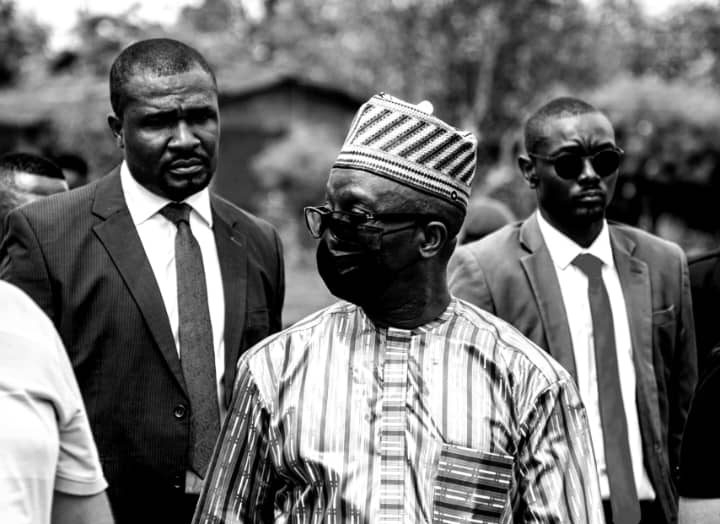Nigeria News
Okpebholo: Edo Govt Calls For Collaborative Effort On Anti-Cultism Fight

The Edo State government under the leadership of Governor Monday Okpebholo, has asserted that the war against cultism in the state is winnable.
This assurance was given in a statement issued by the Chief Press Secretary to the Governor, Fred Itua, which expressed the commitment, courage, and clarity of the government to tackling the meance.
The government has acknowledged that cultism has long been a pervasive threat within the social and criminal fabric of Edo State, affecting schools, communities, and political arenas.
However, the Edo State government noted that a change is underway.
According to Itua, for the first time in many years, the government has observed that it is vocal against cultism and actively working to eradicate its foundations and repercussions.
Itua remarked that Governor Okpebholo took office in a state marred by violence linked to cult activities, which ranged from senseless murders on university campuses to vicious retaliations in local government areas.
This ongoing crisis, he said, has resisted superficial solutions for years. Yet, the current administration is presenting a comprehensive strategy, underpinned by legal frameworks, executed with determination, and driven by the conviction that safety is an inherent right rather than a mere privilege.
The statement made available to Naija News on Tuesday morning stressed that Governor Okpebholo’s initiative against cultism transcends immediate safety concerns; “it is about the legacy we aim to establish. It involves reclaiming educational institutions, public spaces, markets, and sacred sites that have succumbed to malevolence. It is about ensuring that a 13-year-old boy in Iruekpen, a girl at Auchi Polytechnic, or a vendor on Upper Mission Road can live without fear. It emphasizes that governance in Edo State is not merely about holding a position of power; it is fundamentally about assuming responsibility and safeguarding lives.”
The statement added: “This is why the Governor’s directive to turn demolished cult dens into symbols of statehood—police stations, youth centers, rehabilitation clinics, and libraries—is profound. These are not random decisions; they are deliberate responses to reclaim physical, psychological, and ideological spaces.
Under Governor Okpebholo’s anti-cultism campaign, key successes have been recorded. There has been an increase in the arrests and prosecution of cult leaders and members. In collaboration with the Nigeria Police Force, the Department of State Services (DSS), and local security networks, the state government launched a targeted offensive against cultism hotspots across Benin City, Ekpoma, Auchi, and other flashpoints. In the last two months alone, security agencies have arrested over 120 suspected cultists, many of whom are now facing prosecution. Unlike in the past, this administration ensures that arrests do not end in silence—they proceed to the courtroom.
“The war against cultism has equally witnessed a disruption of cult activities and the recovery of weapons. Intelligence-led operations have led to the disruption of initiation ceremonies, the sealing off of meeting locations, and the recovery of arms, charms, and dangerous weapons. The governor’s directive to security operatives has been clear: no tolerance, no compromise, no retreat. This has inspired confidence among citizens who now tip off authorities with actionable intelligence.
“This audacious campaign has received legislative backing and policy reforms. One of the strengths of this fight is its legal reinforcement. The governor initiated amendments to the state’s anti-cultism law, tightening loopholes and providing stiffer sentences for both perpetrators and enablers. The law also empowers community vigilantes and recognised security outfits to legally collaborate with the police on cult-related intelligence and operations. This legislative clarity has removed bureaucratic barriers that often delay justice.
“The campaign has also witnessed community mobilisation and youth sensitisation. Governor Okpebholo understands that arrests alone are not enough; cultism thrives on misinformation, fear, and youthful desperation.
“The administration has therefore embarked on aggressive youth sensitisation campaigns in schools, markets, and worship centres. Working with the Ministry of Education, anti-cultism clubs are being resuscitated in secondary schools, while tertiary institutions are being engaged through student union governments and faith-based fellowships to combat peer pressure and organised recruitment rings.
“Another major boost for the campaign is the partnership with religious and traditional institutions. In a shift from past approaches, the state government is leveraging the influence of traditional rulers, pastors, and imams to delegitimise cultism as a means of power. Town halls have been held in Esanland, Edo South, and Edo North, where palace chiefs and youth leaders signed public declarations renouncing cultism and pledging support to the Governor’s campaign. This has given the war a cultural and moral backbone.”
Motivation For Security Operatives
The statement also emphasised that Governor Okpebholo has strongly committed to enhancing the state’s security framework.
The strengthening of the Edo State Security Corps, along with collaboration with vigilante groups, has resulted in a noticeable presence and prompt response in previously overlooked areas, Itua noted in the statement.
He added that Governor Okpebholo has allocated funds for the logistics and welfare of field operatives, recognising that effective crime fighting necessitates that those who put their lives on the line are both motivated and adequately equipped.
The statement read further: “But this is just the beginning. For this anti-cultism campaign to be sustained and institutionalised beyond media headlines, it must become a people’s movement. We therefore call on all critical stakeholders to lend their voice and weight to this war.
“To the revered traditional rulers across the state, this is the time to go beyond palace meetings. Public declarations, youth summits, and community watchdog structures must be backed by royal authority. As the spiritual and cultural authority no law enforcement agency can match, these leaders must publicly denounce and de-legitimise cultism during village meetings, festivals, and palace gatherings. They must instruct youth leaders and community chiefs to report cult activities and bar them from masquerading as cultural groups. Also, the enforcement of cultural sanctions on families and compounds known to harbour cultists is key. When the throne frowns, the people listen.
“To pastors of megachurches, imams of large mosques, and spiritual leaders, your pulpits must become platforms of truth and safety. Condemn cultism openly and counsel the confused.
“To content creators, skit makers, influencers, and celebrities, reject the romanticisation of cult culture. Don’t make comedy out of tragedy. Use your reach to save lives.
“To student leaders, NANS representatives, and campus journalists, be allies, not apologists. Speak up. Advocate reform. Support whistleblowing systems.
“To the Nigeria Union of Journalists (NUJ), Nigerian Bar Association (NBA), Nigerian Medical Association (NMA), and other professional bodies, we urge you to take public positions in support of the administration’s efforts. Host seminars. Write communiqués. Lend legal and moral support.
“Let it be said in our time that Edo State stood firm against a generational menace and chose peace over violence. Governor Monday Okpebholo has demonstrated that with leadership, focus, and bold action, the war against cultism is winnable. But he cannot do it alone.
“Let every Edo son and daughter, home and abroad, rise to this noble fight. Cultism must die so that Edo may live.”












